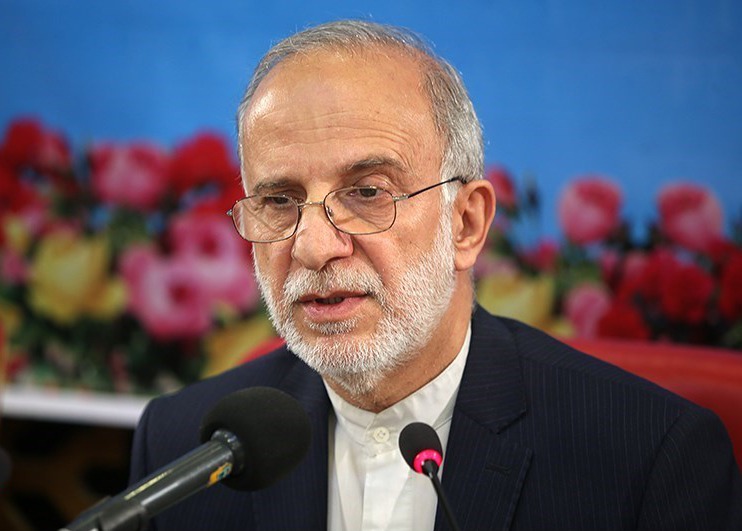Referring to the ceremonies held in other countries to commemorate General Soleimani in the first anniversary of his assassination by the US government, Mehdi Mostafavi told the Strategic Council on Foreign Relations that glorious ceremonies were held in countries such as Syria, Lebanon, Iraq and Yemen that support the resistance movement and this indicated that the people in these countries are in favor of resilient struggle against Zionist and American plots.
Mass participation of people in the ceremony to commemorate General Soleimani
Mostafavi said such profound support for the resistance front is provided at a time when massive efforts are made by the Zionists, the global arrogance and their clients in the region to weaken the resistance movement, adding that mass rallies were held in some countries such as Pakistan, Afghanistan and Far East and this was not expected by the politicians.
“This indicated that sport for resistance movement among Muslims is very serious and the Takfiri ideology has no place among the Muslim community.”
Head of the Scientific and Cultural Commission of the Strategic Council on Foreign Relations reminded that the Takfiri ideology was strengthened officially by the United States when it created Daesh and tried to infiltrate the minds of the Muslim Ummah in order to pave the grounds for the presence and influence of the global arrogance and Zionism after weakening the semantic and soft power of Muslims.
Mostafavi said rallied were formed to support the path initiated by General Soleimani and reject the efforts by the global arrogance.
“Definitely, these rallies are encouraging for other Muslims and would prevent them from feeling that the path of the struggle against arrogance, Zionism and Takfirism has weakened and been isolated.”
Necessity of benefiting from the capacity of the presence of the Muslim Ummah in the General Soleimani martyrdom anniversary
Referring to the necessity of utilizing and bolstering such a great strategic capacity, he said the Muslim Ummah should be able to identify its enemy first.
“Knowing the enemy is very important in this track. Methods used by the enemy in weakening the power of the Muslim Ummah should be identified. Moreover, the Muslim Ummah should be able to build up properly the foundations and fundamentals of Islamic thought and values and be armed with resistance and Islamic values.”
He added that if Islamic values are properly invigorated, the soft power of Muslims would be boosted and “we can stand on out feet and perfectly defend our interests.”
“Here the line between the good and evil should be totally clarified while division and eclecticism should be avoided in the evil and good front. Takfirism and eclecticism should not be allowed to influence the righteousness front.”
Mostafavi said if we believe in God’s trust and commit ourselves to upholding Islamic values, we can defend our interest appropriately with recourse to the assistance of the Almighty God, His Blessings and good capacities of the Muslim Ummah.
The member of the Strategic Council on Foreign Relations compared the legacy of General Soleimani and his growing popularity in the first anniversary of his martyrdom with the troublesome exist of Trump from the White House and said “there is an ongoing war between the good and evil fronts in the same manner as the struggle of the third Shia Imam Hossein (AS) against the evil of the time.”
Today we see the evil front is making efforts to strengthen itself against the righteousness front, he said.
General Soleimani martyrdom resulted in boosting the morale of the resistance front
Mostafavi explained that Trump is one of the leaders of the evil front who openly confessed that he had a hand in assassinating General Soleimani.
“This is while we know that many of the people struggling in the direction of the righteousness front have been martyred by this Trump, the global arrogance and the Zionists. They were supposing that with the assassination of General Soleimani, his path and the resistance front will be crippled and finally eliminated. However, we see today that General Soleimani martyrdom boosted the morale and spirits of the resistance front and highlighted the significance of Islamic values and this will definitely continue in the future.”
He said it appears that the confrontation between the good and evil will also continue in the future, adding that the global arrogance and Zionism would continue their efforts to influence Muslims and plunder the resources and interests of the Muslim Ummah and the oppressed people.
“This is because of the arrogant and excessive nature of them who have kept themselves away from divine values. Normally, the oppressed people, Muslim and the righteousness front will not allow their resources and interests plundered by the arrogance front. At the end of the day, the righteousness front will be victorious. Sometimes, clouds might prevent the sunshine however they cannot permanently stop the sun from shining.”










0 Comments